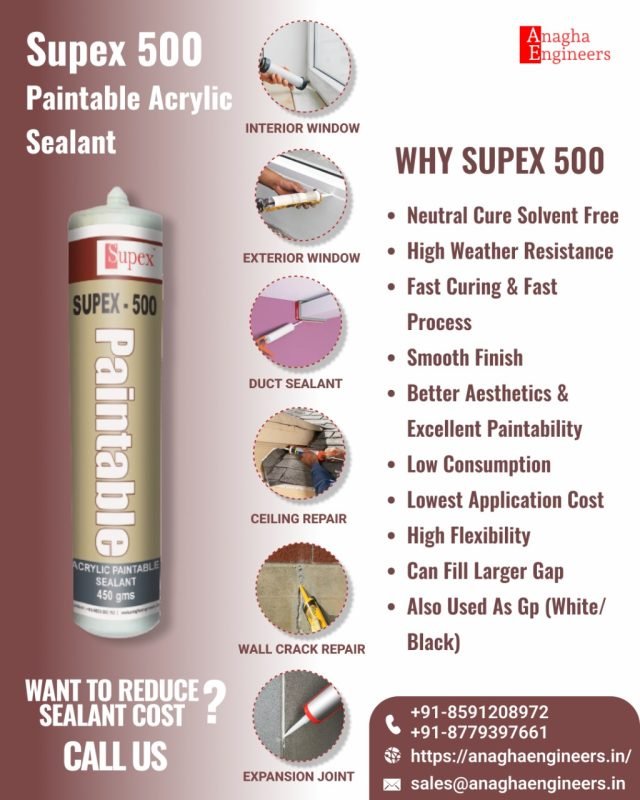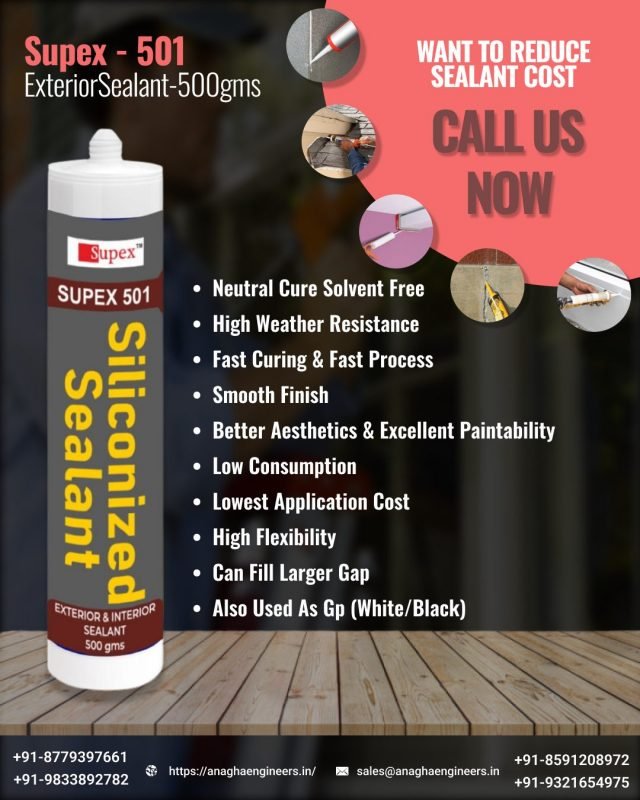Acrylic sealant is a very popular sealant used for upvc, Aluminium door and window sealing.
Question to uPvc door manufacturer – What type of WINDOW seal sealant do you require ?
Answer : Lowest cost , means lowest cost of the sealant bottle .
May be the customer doesn’t even know the quantiy of sealant per bottle .
If cost is the criteria for purchasing then should it be lowest cost of sealant bottle OR lowest cost of sealing per DOOR/ WINDOW ?
Total cost of sealing per door/window includes:
- Quantity of sealant used per door
- labour cost of sealant application
- repair cost in case it leaks within warranty period
- cost of ‘loss of reputation’
- uPvc window sealant cost per ml/ gms
Hence it is important that we choose the right window/door acrylic paintable sealant.
There are few popular options to be used as uPVC window/door gap filler sealant.
| Advantages | Disadvantages |
Silicone Sealant | Flexibility Weather Resistance | Inadequate adhesion with surface Difficulty in finishing, aesthetics Higher cost |
Acrylic Sealant | good adhesion Finishing easy, aesthetics Paintable Low cost | Low flexibility not high gap fill ability |
Putty | Low cost Paintable | Cracks with time Rigid High application cost |
Window Sealant -Key properties required
- Flexibility, high elongation – does not break under expansion and contraction
- High Weather and UV Resistance
- Good bonding with surface- long life
- Paintable
- Low Cost – product and application cost
- High gap filling capability ( up to 6 mm)
- Anti mould / anti fungal
Best acrylic sealant in India
- Excellent bonding with uPVC , concrete, Brick, Granite
- High gap fill capacity
- Paintable
- UV & weather resistant
- Solvent free, water based formulation
- Cost – lower than Silicone sealant
Application method
- Surface must be free of dust, grime and grease
- Apply uniform bead of the sealant in the gap
- Sealant surface may be smoothed with a wet sponge or fingers
Additional Application areas of Acrylic sealant
- HVAC duct sealing
- Gap Filler – for sealing of construction joints
- Expansion joint sealant between prefabricated building material
- Installation of Wood, PVC, Iron, Aluminium joinery. Paint sealant,
- Joints of all kinds of Building material
- Crack filler – Internal and External walls,joints etc
Packing , shelf life
500 gms cartridge , 12 months from Date of manufacture, store in a dry place at around 30 C.
NOTE: Not suitable for glass bonding . Recommend to test the product sample for any applicationbefore using for mass production.
What is window seal acrylic sealant?
Acrylic sealant is a synthetic, water-based ingredient made from acrylic resins, used for caulking, jointing and filling cracks and gaps in used the construction, HVAC and other numerous applicaions. It is a popular sealant in India for uPVC door/window manufacturers too.
Acrylic sealant price and availability
Supex 500 is an acrylic sealant manufactured for India by Supex, Navi Mumbai. With one phone call – 9833892782, you can get the material delivered at your site.
Acrylic vs silicone sealant
Acrylic or silicone sealants look very similar in texture and appearance. Sealants primary purpose is to fill gaps. Whether we use acrylic or silicone, depends on several factors.
1. What is an acrylic sealant and what is a silicone sealant
silicone and acrylic are similar in nature and in the cured state are rubbery, so can we distinguish between the two . Acrylic is matte and silicone glossy.
2. applications of silicone and acrylic
Silicone has good elastic property and preferred in areas with joint movement. Anti fungal silicone is used in bathroom and kitchen Silicone is permanently elastic and therefore best suited for joints in the bathroom, kitchen and expansion joints.
– Expansion joints and connection joints in sanitary areas
– Sealing of expansion joints in the floor area and wall area
Acrylic is a plastoelastic sealant that offers some advantages over the silicone. It is paintable and can be used for cracks in masonry, which is unheard of with silicone. Acrylic is ideal for applications where no contact or little contact with water. The acrylic sealant keeps really well on plaster, walls, wood and plaster.
– Strain and connection joints in interior design
– Joints and connections to concrete, aerated concrete, plaster, masonry, wood, plasterboard, fiber cement, shutter boxes, window sills, etc.
3. Advantages and disadvantages of acrylic and silicone
An important advantage is that you can paint over acrylic, has low/no odour.
Disadvantage is that it can not be used in damp places, otherwise you might get mold. Acrylic also draws dust and dirt as it is coarser in structure than silicone. Acrylic has a volume shrinkage during curing since.
With silicone disadvantage is the silicone is not paintable, low cost GP grade has volume shrinkage, strong odour. Advantage, however, is that silicone is permanently elastic silicone as a sealant.
4. Application of acrylic and silicone
Acrylic and silicone are both dispensed with a caulking gun, battery operated gun or pneumatic gun. They are available in cartridges or sausages.
How long does it take for the acrylic sealant to harden?
Ambient humidity and temperature are the key factors. Water evaporates from the acrylic so it hardens more quickly in warm and dry conditions. Joint dimensions are also relevant. Hardening occurs from the outside in.
Which substrates can acrylic sealant be used on? Is a primer required?
Paintable Acrylic sealant is primarily used on absorbent, porous substrates. If the substrate is too damp, the acrylic may take longer to harden.
Primer is generally not required for application of acrylic sealant. . This sealant is not suitable for waterproofing.
How should an existing acrylic joint be reinforced or repaired?
Acrylic joints can be repaired using the same material. The adhesion between old and new acrylic is good. Any existing sealant must be clean and securely attached to the substrate


Best UPVC window seal sealant


